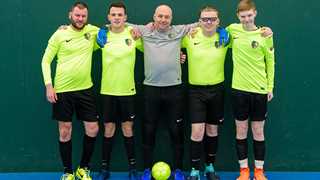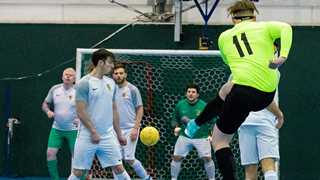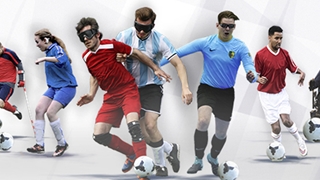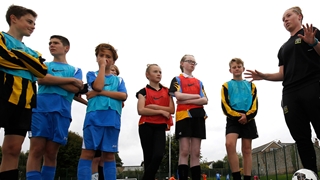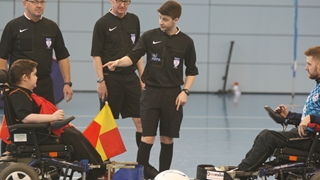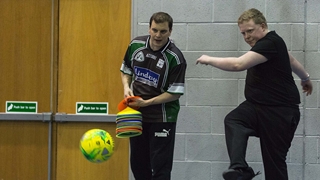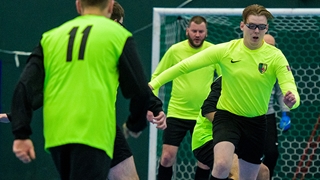
In January 2013, I was in a P.E lesson in school.
We were playing a capture-the-flag style game in the snow when one member of the class rugby tackled me to the floor and threw a snowball at me.
This ruptured a blood vessel going from my neck to my brain and the following morning I had a stroke which took away my left-sided peripheral vision.
My parents took me to the doctor that morning. The doctor who saw me mis-diagnosed my condition and told my parents I had flu-like symptoms and that there was nothing wrong with my eyes or my sight and to go home and sleep.
I always knew that I had a problem with my sight but I could never explain what the problem was due to the damage to my brain. The stroke had damaged my brain to the point that I had no idea that there was anything to the left of me, therefore making my condition almost impossible to explain at the time.
This led to most people, including my parents, to not believe that I had a problem as I seemed to be acting like I usually would. It was only when I started to learn to drive at 17 that my sight loss became noticeable.
My instructor had told me that while we were driving he was going to raise his hand and when he did I had to perform an emergency stop. He raised his hand later on in the lesson and I failed to notice he had done it and carried on driving. After the lesson he questioned whether I saw his hand and I said no. He then recommended I go back to my doctor and be seen again.
I then saw a different doctor and he referred me to a brain specialist at Walton Hospital called Dr Pomeroy. After months’ worth of testing, he finally came to the conclusion and told me the news that I had a stroke which he dated back to the date of the original incident over 18 months previous.
It was at this point where I was finally registered visually impaired and the realisation of what that meant started to sink in.
My confidence was destroyed, I struggled going anywhere on my own, I wouldn’t talk about my condition to anyone in fear of them judging me, I found myself drinking most nights and really not taking very good care of myself.
It was only the fact that my parents saw what was happening and what I was doing to myself that anything changed. They tried to get counselling for me so I could speak with someone who knew how to deal with my situation and help me and give me advice.
My mum then arranged an appointment for me at the Macclesfield Eye Society, place that specialises in helping people with visual impairments through support and finding activities for people to do. I spoke with a woman there and she asked what I enjoyed doing before my stroke.
Immediately my answer was playing football with my friends, something I always thought I wouldn’t be able to do again. She informed me that her step-son was also visually impaired and that he played football in the National Partially Sighted Football League and then gave me the details of Dan Pack, the secretary of the league who also ran North West Scorpions.
My confidence was so rocked that although this was something I was highly interested in doing, I was reluctant to contact him and get involved due to the overwhelming fear of being rejected or knocked back.
With the support of my parents I finally made the call and was invited to come and watch the team play at one of the monthly league tournaments.
It was a real shock to me to see just how many young, visually impaired people were there getting involved and competing.
It made me realise I wasn’t on my own and that there were other young people in a similar situation to me.
From that moment I couldn’t wait to get signed up. I competed in my first tournament the following month and never looked back. I became much more confident in myself and became more open about my condition to people without that fear of being judged.
Naturally, I became fitter and started to take more care in myself and cut down my drinking. Also, through having something to put all of my focus into, I found myself not thinking about my impairment as much and instead going about my life as a normal teenager would do.
Did you know that powerchair footballers have to pass a speed test before competing❓
— The FA (@FA) 13 June 2018
We went to take a look ahead of this weekend's #FADisabilityCup Finals… pic.twitter.com/Sm0hRu7alr
I’ve also enjoyed great success while being a part of the league, the main highlight being winning the national player of the year award as well as the two national cups that I have won with North West Scorpions.
Having those trophies there to look at helps me focus on what I’ve achieved instead of what has happened.
To summarise, the league has done a massive amount for me, it’s helped to rebuild my confidence and show me that even though I have an impairment, that doesn’t need to be the defining thing about me.
I’ve met some fantastic people through the league and made some friends for life along the way.


